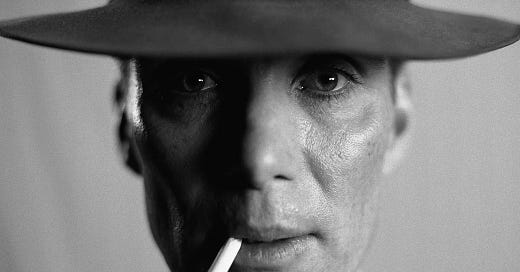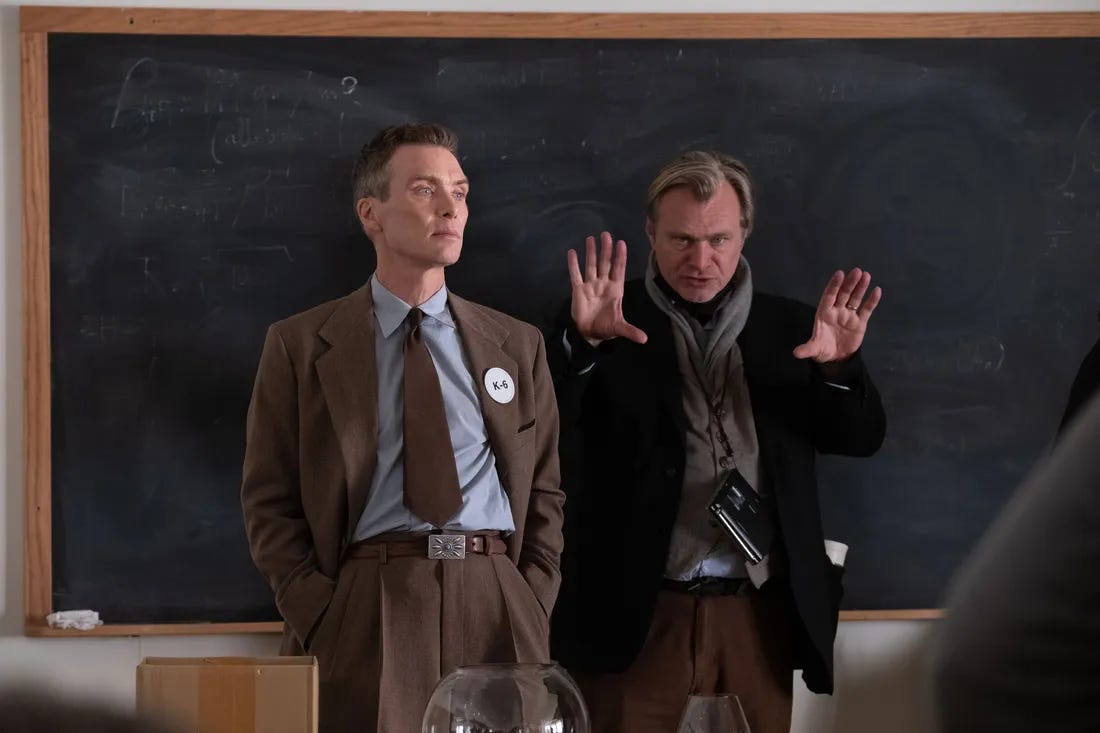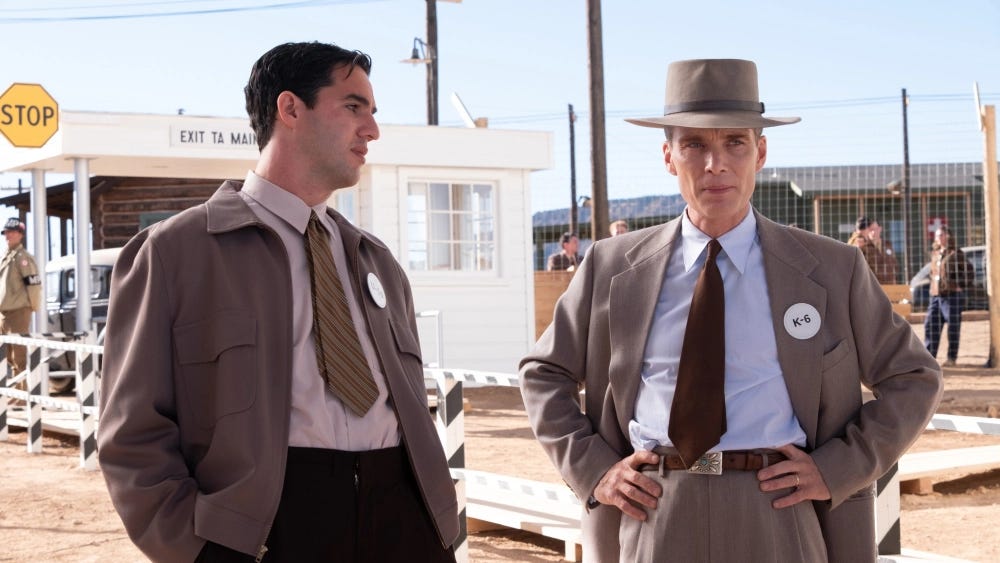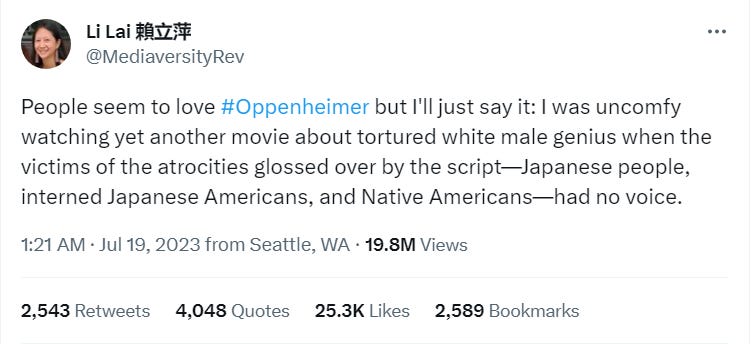Memes aside, the movie is well done. Political fodder disguised as criticism aside, the movie has a few minor issues. But what Christopher Nolan’s Oppenheimer manages to do with its three-hour runtime and grand cast of actors, is use this historical framework to make a statement about the world we occupy today. The most striking theme through the entire film is what I would call, the courage of one's convictions. And it isn’t subtle. Despite all odds, stand firm in one’s convictions if one believes them to be right. Whether it’s a disbelief that the bomb could even be built, or the full frontal assault of the McCarthy era, stand up for one’s beliefs.
There are places where Oppenheimer deserves fair criticism, but projecting one’s own political wishes onto the work of art is a misstep. Wrongheaded. Most of the criticism around the film has been about either its length or, yes, whiny, viral posts from political activists disguised as serious art connoisseurs. The hollowness of these politically biased criticisms needs to be taken to account.
The first half of the movie is an absolute triumph. In fact, the first half of the movie is so well-paced and directed that I was getting excited to label it a masterpiece. (which it is) Admittedly, this is my own bias, as I was eager to praise Nolan’s work after the largely still yellowed disappointment of Tenet, Nolan’s previous film from 2021. A movie that failed to come together on almost every level. Though, its ambition is to be admired.
In Oppenheimer, Nolan aims big once again. And he nearly crushes it out of the ballpark on the first pitch. Oppenheimer is a biopic that manages to make mostly government bureaucrats and nerdy physicists sitting around tables and laboratories exciting. Building to the climax of the film—the bomb. The moment we had all known was coming, but still, Nolan manages to make it so thrilling that it pays off for the viewer.
Innovations in science have rarely been exciting to those of us who do not understand them. Large particle colliders are hardly exciting innovations when compared to the creation of the bomb to end all wars. And the movie makes clear this is how many on the project naively thought about their work at the time. That the power of the bomb may work as a deterrent for further war. Of course, the cold war arms race that the film touches on towards the end was not foreseen. Nolan manages to use the ticking clock element to full effect on viewers. The suspense is in the necessity to complete the bomb before the Germans or Russians during the war. And this is done smartly, fairly, and even with a little bit of well-placed humor. Nolan deserves praise for it.
And Nolan clearly knows what he’s doing. A master of the craft at work. And yes, sometimes a master can make a bad movie, like Tenet, and sometimes a master can make a brilliant movie that makes a serious impact on the culture while commenting on our present time. Oppenheimer is one that will set the bar for all other historical biopics going forward. It deserves to be the new standard bearer of the genre.
Cillian Murphy as Oppenheimer is never outshined by the other characters on the screen and Nolan manages to keep a lot of moving parts and a lot of characters in a tight, constantly moving plot with performances from some Hollywood greats. (too many to name in a single article) All working in unison with one another and almost every actor manages to capture their parts with a reverence for the historical significance. Robert Downey Jr. as Lewis Strauss, giving a wonderfully subtle (and Downey schtick free) performance. Florence Pugh as Jean Tatlock, almost haunting in her portrayal. Josh Hartnett, giving a wonderful performance of Ernest Lawrence. Gary Oldman giving a delightful portrayal of Harry S. Truman. With countless others popping in and out of this star heavy and very large cast. Among the many names, Emily Blunt giving a wonderfully quiet performance as Oppenheimer’s alcoholic wife is at the very top. Matt Damon playing Leslie Groves is another. Giving a great back and forth with Murphy in every scene they share together. In all honesty, I would have preferred a little more screen time from Blunt, but It may be purely for selfish reasons. She manages to knock out every role she touches. And her character embodies the main theme of standing behind one’s convictions Encouraging her husband to fight when he is being smeared for his political affiliations by powerful partisans in the American government at the time. A silent shot of her refusing to shake hands embodying the heart of the film.
The first part of the film captures the gamble of it all. The risk. The dangerous excitement at pushing the boundaries and possibly failing. And all this despite the odds and naysayers insisting otherwise. The best minds of the generation coming together to create—and Nolan emphasizes this with great finesse—one of the most destructive forces on the planet. As viewers we have rarely seen such a thing. A film that manages to thrill the viewer as we watch the plan come together, while still managing to create the reverence and conflicted reflection of the brilliant minds that created the bomb. Nolan deserves a standing ovation for threading the needle. And he may just get it.
I don’t think I can emphasize enough how well this movie manages to make thrilling the ordinary conversations about physics. Dumbing it down enough for viewers like me to understand and follow the basic concepts, while still adhering to the rigor and seriousness of the task. All paying off for the viewer with the successful first test of the bomb that takes place about halfway through the film.
Information spills out at the audience. Exposition giving details with every word. Referring to events and characters that will be revealed later as the film progresses. This is a sophisticated movie and it expects its viewers to be just as sophisticated. Something no one seems to be praising Nolan for. I hadn’t been to such a crowded movie theater for an afternoon matinee in perhaps a decade. Almost every seat was full. Clearly Oppenheimer is filling the void constant reboots and snarky Marvel movies have left in the movie going public. A movie that requires one to pay attention. Little plot changes and curves in almost every scene. Layer upon layer revealed as we watch the full three hours play out in front of us. A smart, daring, and darkly contemplative film.
The film is cut brilliantly. The pace only getting slightly disrupted in the latter half, when it slows down to explain the smear campaign against Oppenheimer years later. And I want to emphasize, only slightly disrupted. Those complaining about the runtime must have forgotten to take their ADD prescriptions before watching. From what I can tell, it is because the ticking clock element that was driving the punchy pace of the first half is no longer a factor, so the film hiccups slightly as it transitions to the courtroom style political drama it blooms into, picking back up quickly after.
There is no denying that Nolan had complete command of the subject matter and the artistry. (despite the history nerds pooh-poohing creative license) All of this abundantly clear from the very first shot. The images of fire swelling endlessly upward. Explosions rippling across the giant movie screen. There is no other word for it than absolute brilliance. Using every opportunity to emphasize the power of the bomb. The destruction. And Nolan takes it a step further. Using these grand-scale images of flames to also represent the inner turmoil of Oppenheimer throughout the film. Bright bold flashes of pure fire, pure destruction, annihilation, symbolic representation of not just the power and terror and horror of the bomb itself, but the mind of its creator. The moral wrestling with oneself constantly being brought up. And the courage of Oppenheimer to stand his ground regardless.
I can’t say enough about the sound editing. Nolan manages to use the structuring of silence to juxtapose the loud forceful explosions of the bomb to show Oppenheimer in conflicted revelations. The power of the bomb, even just briefly reminding the audience of the mighty force behind the sound. Images of the air on fire rippling across the screen mixed with sudden boughs of silence. The contrast it creates jars the viewer. And of course, this is intended. But I have seen very few critics acknowledge how well this is achieved.
One of the best scenes in the entire film is when Oppenheimer announces the success of the bomb ending the war to his team at Los Alamos. The art of Nolan’s filmmaking on full display as the constant cuts from feet stomping to explosions to Oppenheimer’s own troubled thoughts is a triumph of cinema. Showing why this movie deserves an Oscar for sound editing in this short scene alone. The percussion of explosives. The dead silences. Clearly showing us how haunted Oppenheimer is by the success of the bomb itself.
But with a movie of this size, this scale, this many moving parts and characters to keep track of, Nolan uses his artistic flourishes in very subtle ways. Ways I think are being underappreciated in favor of political agendas. Many of the critiques seem to be motivated by historical pandering. Or, even worse, social justice identity politics. Insufferable injections of politics in both circumstances. The main failure of these political frameworks being that they do not address the achievement on the screen. What Nolan was able to pull off.
There are no huge action sequences like The Dark Knight. There are no mind-bending stunts like Inception. This is pure artistic output. Using well-harnessed techniques to pull the viewer through the three-hour-long runtime. And it does. It pulls you through the entire time. Lagging only slightly as the complicated second half takes shape.
And this is where the film shifts into Oppenheimer’s personal turmoil. And Nolan manages to handle it in a way that does not weigh down the film. Something so many biopics fall victim to. Trying too hard to squeeze it all in. Every detail. And, of course, the three-hour runtime allows Nolan to play around with it, but—I’m repeating myself again, but I don’t care—the pacing is impressively clean and clear. Especially for a film that consists of mostly meetings as we jump from scene to scene, event to event, time period to time period. It almost resembles a superhero film with “assemble the team” as the best minds are gathered. With hefty doses of reluctance and hesitation over certain political leanings.
And, of course, judging by the weak, terminally online, overly emotional outpouring of unfair criticism the film has received—almost all of it coming from the angle of attacking either Nolan’s own personal politics, or insufficient deference to DNC policy proposals, or insufficient adherence to the plight of the Japanese, or insufficient adherence to acknowledging sexism in some way, or insufficient adherence to the fabricated Bechdel test, or insufficient nerd-like adherence to historical fact; which, it needs to be pointed out, are all made up metrics that embody political bias disguised as artistic expertise—it is no surprise that the reverent tone the movie manages to capture—that of reflection, concern, regret, all over the loss of human life, the destruction of the world, the worry over any one person or government having too much power—has been lost on viewers with this obsessive and hyper-partisan framework.
It seems these types of critics are only concerned with how well the art can be shoved through the meat grinder of political policies they believe should be enacted. This is a limiting lens to view not only art through, but the world. And it is no surprise that many are accusing the film and Nolan of being a witch (not adhering properly to DNC politics). It is this stunted way of thinking about art, this forced external framework over the film, that lets certain political activists claim that any given film is sexist, racist, homophobic, etc—pick one from the litany of repeated phrases so-called critics trade on social media daily. It is always an insult to the art of criticism to be so cheaply embedded in external frameworks, but furthermore, it is an insult to Nolan and the film because it makes clear they are not taking it seriously.
However, politics is not entirely absent from the film. In fact, the film takes great care to emphasize the details and shameful sloganeering and witch-hunting of the McCarthy era. The stranglehold purity politics had over 1950’s America. Of course, the actual politics in the film are shown to be limiting. Blinding. Closed-minded and short-sighted, but these warnings are lost on critics who opine about their own preferred politics being underrepresented in the film. When really, the film manages to make itself touching in a way. And I am not referring to just Oppenheimer’s love life, which the film doesn’t shy away from.
Nude scenes. Tits and ass. Something missing from R-rated movies for about the last decade. Nolan is unafraid to show it. And it is done so artfully, with graceful elegant camera work and lighting, I find it hard to believe that any critic who says otherwise isn’t being extremely dishonest. But even in the sex scenes, where Pugh manages to appear incredibly sensual and serious, outshining her previous roles, there manages to be something touching about it all. A simple reoccurring act of Oppenheimer bringing his communist ex-girlfriend flowers every time he sees her. Despite her always telling him not to and throwing them in the trash as soon as she receives them. And Pugh in this role is given more screen time than Blunt as Oppenheimer’s wife. And this is why I praise Nolan for being so subtle about it. Nolan manages to have this weave around the grander story of the bomb and the later smear campaign against Oppenheimer himself where the now-dead ex-girlfriend is being used to smear him as a communist. Apparently, these subtleties leave most viewers stumped.
A teenager in front of me at the theater stood up as soon as the credits rolled and declared “That movie sucked. I give it a 4/10.” Of course, it is no surprise that children do not find the movie appealing. Which is why they talk politics instead of film. The themes and the grand scale and cost of such an innovative, bar-setting film lost on the boy.
But Oppenheimer embodies a theme that seems foreign to so many viewers today—the Courage in one’s convictions. In fact, Murphy, with his pained emaciated look in the film, manages to show Oppenheimer in this way better than most actors could pull off. Standing strong and calm in the face of total annihilation. Fear. Political affiliation used as a weapon. A smear. And Oppenheimer, despite this onslaught of reputational and personal damage—does not budge an inch. He stands tall. He does not let himself be bullied out of his convictions. His interests. What he knows to be right. Those that gloss over this central theme of the film are baffling to me. This brilliant, expensive, well-made film in front of them—and all they can do is dismiss it with all the internet snark of having not read a book in years.
More importantly, this theme of conviction is shown to be triumphant. A message that is sorely needed now. And it isn’t a new message. In fact, it’s so old as to be an archetype of storytelling. But it does seem to be rejected by many who view the film on purely partisan political grounds. The subtle use of Albert Einstein, played with a homely and wise demeanor by Tom Conti, is to be applauded too. While the famous figure is used sparingly, he is still used as a wise older character. And his minor appearances here and there give him an almost mysterious air. And it works. The final scene really paying off as he relays the wisdom he himself learned by trying to seek out truth and knowledge in a world that is blind to both. Nolan showing us what a master of the craft he is. Letting it all come full circle in a way, through the wise words of Einstein giving advice to a friend.
One fake criticism that has been circulating the internet and needs to be addressed is this idea that Nolan paid insufficient deference to the plight of the Japanese people. This is despite the film going out of its way to show Oppenheimer’s own squeamishness and disgust and terror at what his creation did to the people of Japan. And this criticism persists despite the clear deference shown on screen because it is political activism—not criticism. And that is an important distinction to make. If Nolan had included an additional hour purely from the Japanese perspective—the criticism would shift to something along the lines of Nolan, a white man, appropriating a story that wasn’t his to tell. Why? Because the criticism is based purely on political activism and a specific set of purity identity politics. Neither of which are serious engagement with the work of art they saw. Or, in many cases, didn’t bother to watch at all before going off about how it was told wrong, made wrong, cast wrong, all from the same boring, tired, endlessly repeated DNC identity politics arsenal. Ready to attack any film with its bag of tricks. Declaring a piece of art “harmful” while accusing the artist of being a witch (a non DNC voter).
But despite this persistence of fake outrage from political activists dressing up as serious critics, there are real criticisms to lay at Nolan’s feet. And yes, it is minor, but it must be mentioned in a fair review. The movie stumbles in a few scenes when it shifts from being a drama about building a bomb to a political and legal courtroom drama. And as a viewer, I stumbled slightly while watching as the train clunked to a stop, then struggled to keep moving as we change gears to the post World War II part of the movie. I couldn’t help but feel like the main climax of the film—the success of the bomb—was over as the smear campaign to revoke Oppenheimer’s security clearance starts to take shape.
And while this pacing disruption is minor, only causing a few snags in the film overall—an impressive feat for a movie that runs for three hours—it is still there.
While all the scenes work overall for the movie, I couldn’t help but notice that shift in tone and pace as we went about the back end of the film. It still ends up working, all tied up with ribbon at the end (with the help of Einstein), but it does broaden out the scope of the film. Where the first half focuses on the most exciting parts of the Manhattan project, the latter half focuses on the more relevant themes of today. The smearing and removal of one’s reputation and position because of the wrong political affiliation. Or more specifically in the film, petty revenge at the hands of Downey Jr. as Strauss.
Of course, these deeply reflective and harrowing scenes of turmoil are conveniently left out of all the scathing politically obsessed reviews of the film. All of the politically motivated critics too blind to see what is on display. One of Nolan’s great accomplishments as a director and writer. And he needed it after the debacle that was Tenet, and not just because of the subject matter, but because of how relevant the main themes of the movie are to right now. This historical moment we find ourselves in. How much it seems to be resonating with audiences that are hungry for something more than a rehashing of what a staff writer saw on their social media timeline that week.
But, most importantly, Oppenheimer is a great success. A movie that sets the bar for all other biopics going forward. One that I hope encourages more filmmakers and studios to invest in grand scale storytelling like this. Nolan showing his own courage and conviction as he smartly depicts how relevant history is to us all. An ever important lesson—more so now than ever. Nolan, no doubt, sees this. Of course he does. We all do. Stand up for what you believe in, like Oppenheimer, and don’t let anyone bully you an inch.
Andrew Wittstadt is a poet, writer, and host of the podcast Heavy Bored. His work has appeared in The Nevada Independent, North Dakota Quarterly, Thin Air, Bending Genres, and Rare Candy. You can follow him on Twitter @AndrewWittstadt











If you are a fan of Nolan you may be interested in the Psyop Cinema series on him: https://podtail.com/en/podcast/psyop-cinema/the-revelation-of-the-method-nolan-1
https://podtail.com/en/podcast/psyop-cinema/the-revelation-of-the-method-nolan-2/
https://podtail.com/en/podcast/psyop-cinema/death-of-the-soul-nolan-3
https://www.patreon.com/posts/death-of-soul-4-56039724